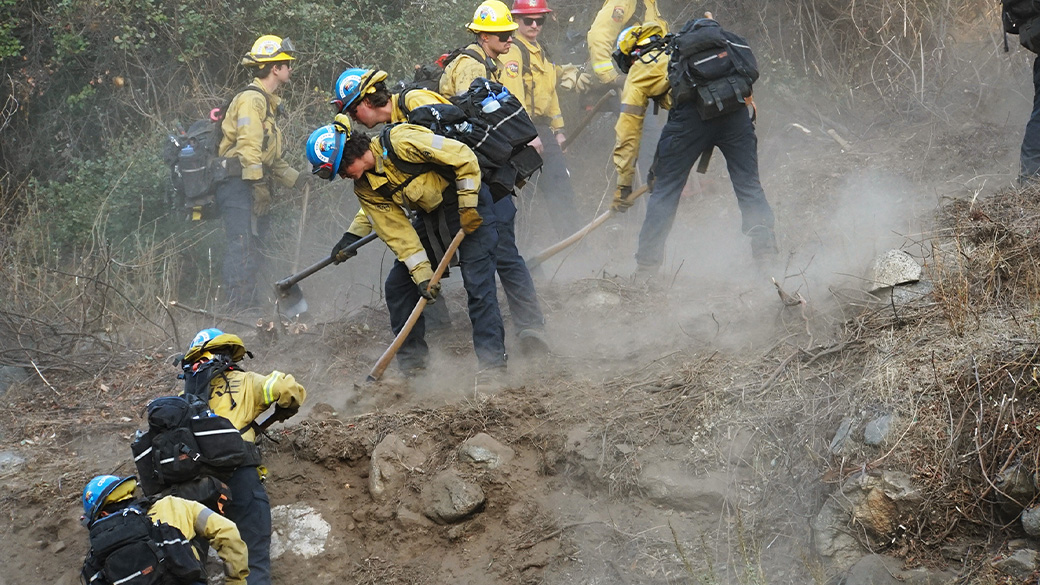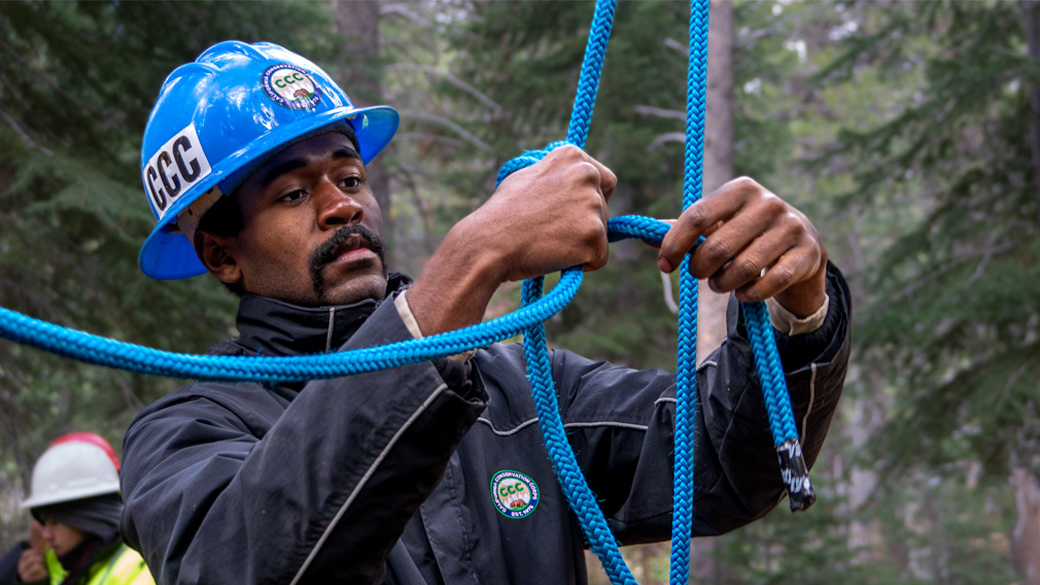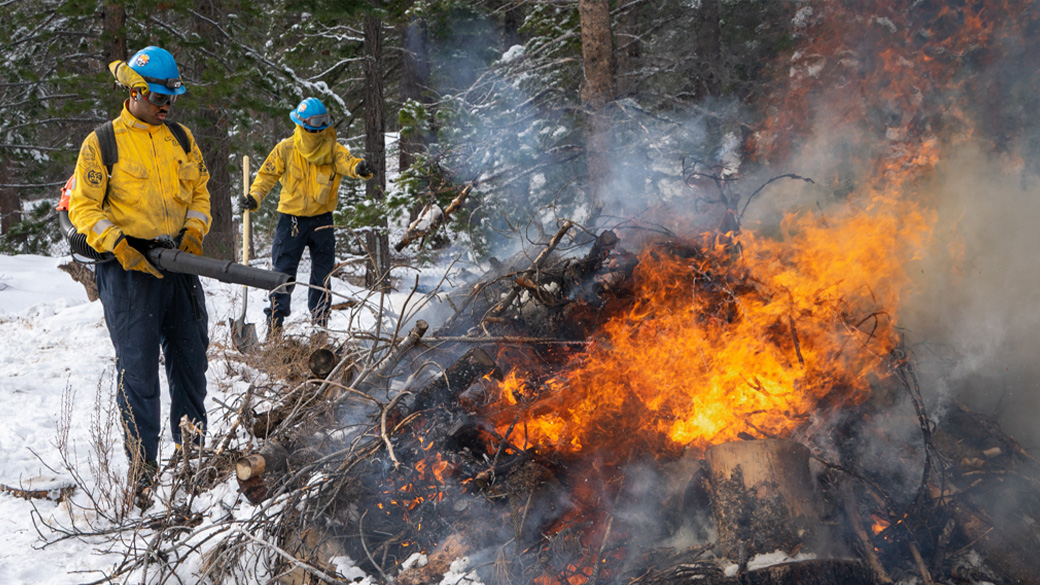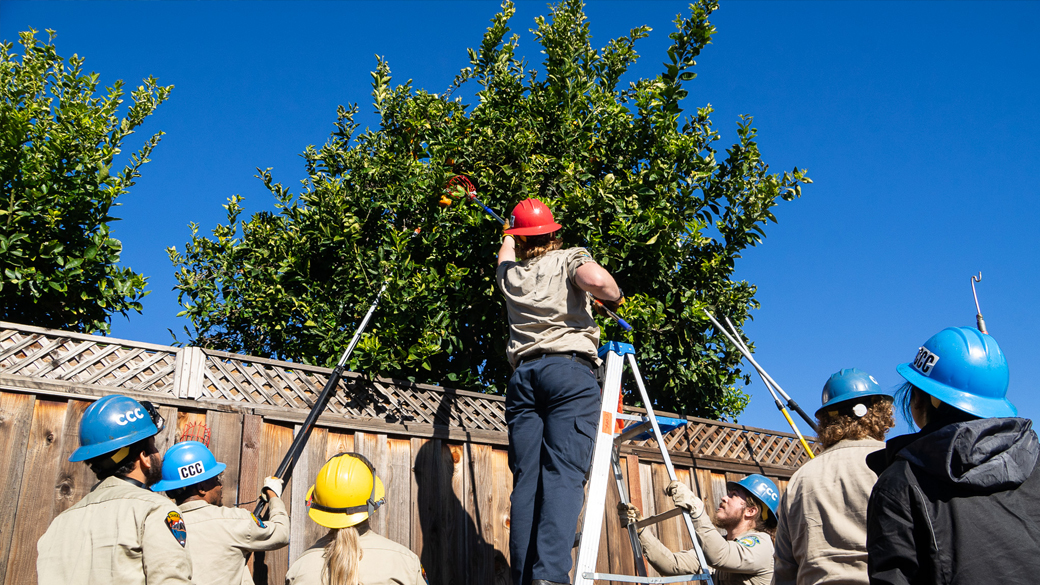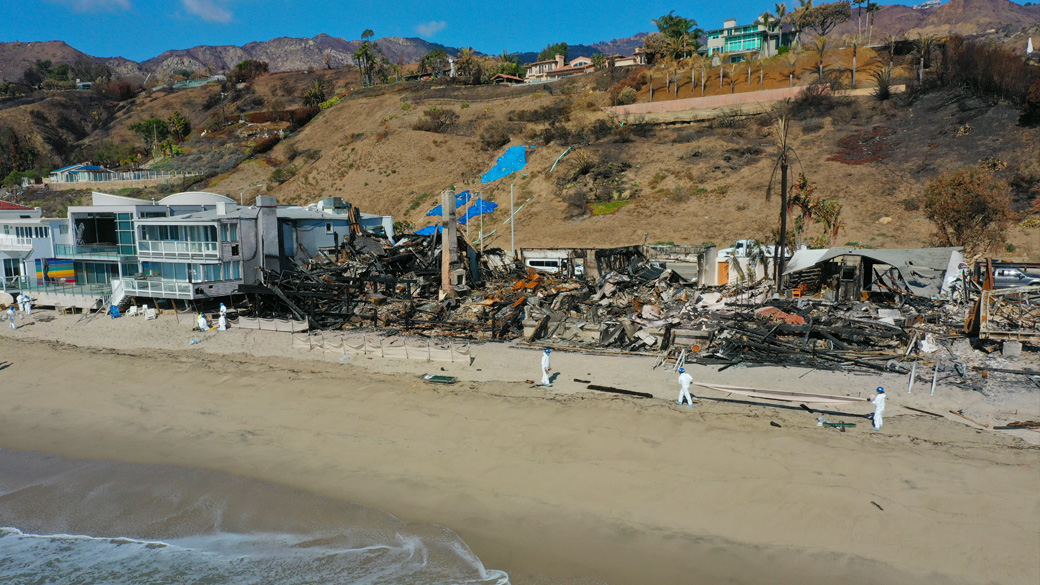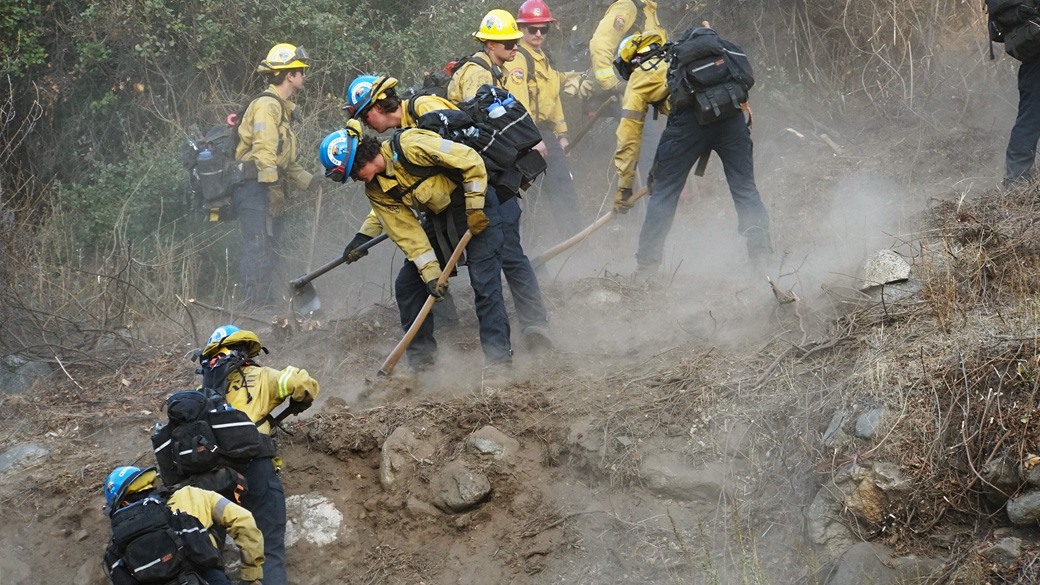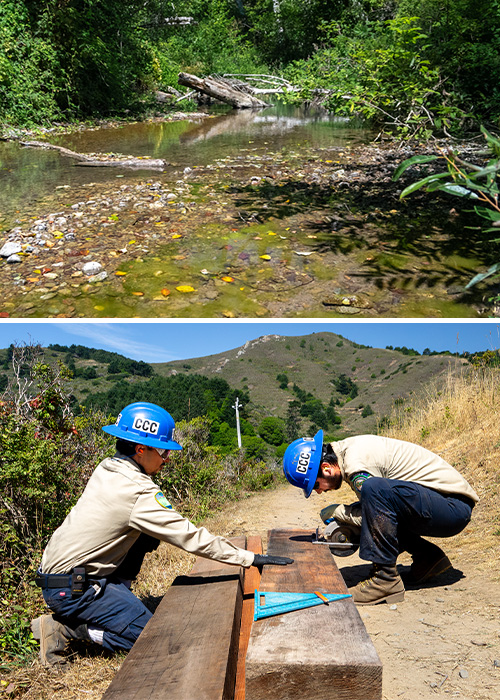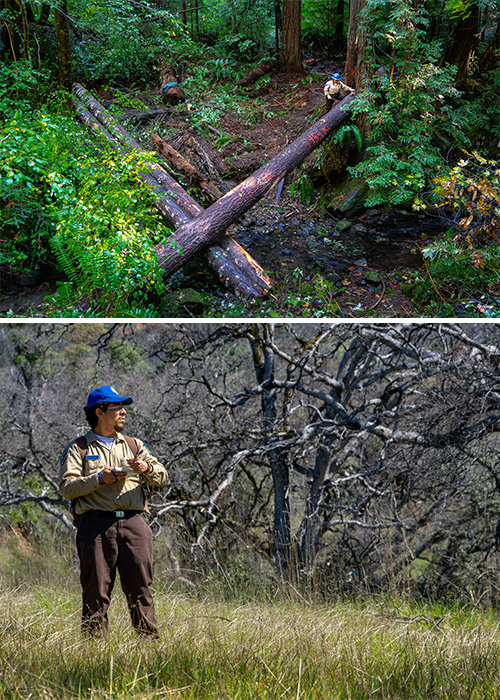Tahoe Center
Watch the Tahoe Center Video Tour!
Corpsmembers at the Tahoe Center work on everything from wildland firefighting and forestry crews to culinary and trails.
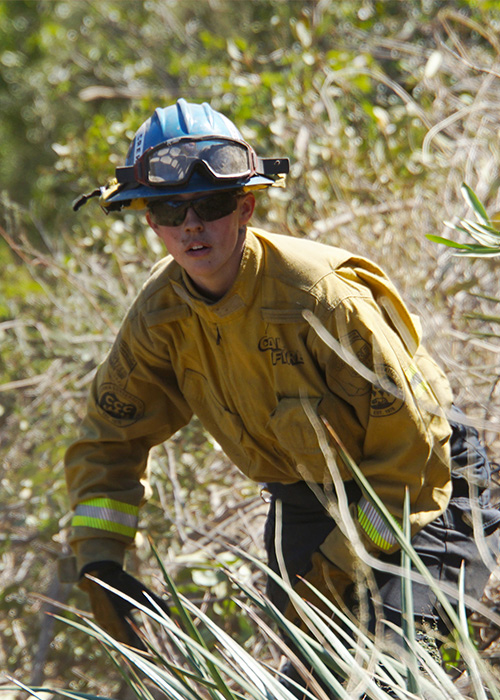
Tahoe Corpsmember Dakota Nations works to clear potential fire fuel along a canyon hillside during the Eaton Fire in Los Angeles County.
Map to Center
Tahoe Center
1949 Apache Avenue
South Lake Tahoe, CA 96150
Get Directions
Train With Us
Get paid to train! The skills and lessons you learn at the Tahoe Center will create a strong foundation for you to launch a meaningful career and transform your life.
Select an icon to learn more about project and training opportunities.
Built Environment
The California Conservation Corps partners with California State Parks, Caltrans, county and city departments, and area non-profits to enhance the built environment. CCC Corpsmembers may complete a variety of projects such as building or maintaining park facilities, installing signage, retrofitting energy systems, creating defensible space, and reducing flood risk in communities.
Built Environment
Culinary
Tahoe Center Corpsmembers train for careers in commercial kitchens, resorts, and restaurants. The culinary crew prepares and provides meals to residents at the center.
Certifications available include:
- ServSafe Food Handler
- ServSafe Food Manager
- ServSafe Instructor/Proctor
Culinary
Emergency Response
All Corpsmembers respond to emergencies across California and beyond. Assignments can last up to 21 days in a row and Corpsmembers may work up to 16 hours in a day, earning excess pay. Crews support wildfire base camps, protect homes from flooding, remove debris, and more.
Emergency Response
Forestry
Corpsmembers at the Tahoe Center improve the health of California’s forests by planting seedlings, collecting cones and seeds, and removing invasive and/or fire-prone vegetation. Corpsmembers enrolled in the CCC complete an array of projects such as planting young trees, collecting cones and seeds, and removing invasive and/or fire-prone vegetation.
Forestry
Habitat Restoration
Tahoe Corpsmembers assess habitats, remove invasive vegetation, plant native species, stabilize slopes, or implement additional modifications to enhance natural environments. Corpsmembers may complete this work in forests, rivers, streams, or other sensitive habitats.
Habitat Restoration
Trails
Serving on natural resource crews, Corpsmembers construct and maintain trails for public recreation. Project work varies but may involve clearing brush, rebuilding trail tread, installing rip rap erosion control, constructing bridges or boardwalks, and more.
Trails
Wildland Firefighting
The CCC Tahoe Center operates two wildland firefighting hand crews in collaboration with the CAL FIRE Amador-El Dorado unit. Corpsmembers cut fire line, lay hose, and mop up wildland fires. They also reduce wildfire risk by removing vegetation, creating fuel breaks, and participating in prescribed burns. Crews respond to local calls and can be dispatched statewide
Wildland Firefighting
Picture Yourself Here
Place yourself in these Corpsmember’s boots and envision life at the Tahoe Center.
Know Before You Go
Weather
Temperatures at the Tahoe Center average highs of 77 °F in the summer and overnight lows of 19 °F in the winter.
Lodging
Food & housing costs $500 per month. Corpsmembers live in a three-story dormitory building with three people per room.
Activities
Join Tahoe’s Corpsmember Advisory Board to organize volunteer events, plan recreation trips, and build community.
Find Your Path
Work with CCC career navigators to chart out your path to success. We can help you leverage your training to launch meaningful careers and pursue educational opportunities. Don’t just take our word for it, check out this alum story.
“I had no idea what I wanted to do as a career before joining the CCC. Camping out and experiencing wildland support operations gave me the bug to want to get involved further. The CCC gave me the training, certifications, and experience needed to land a job with a more demanding and exclusive fire crew.”
Ask Us Anything
We know you have questions about center life. Here are some of the common one’s we get. Have more questions? Give us a call!
Talk to A Recruiter
Facility Questions
Can I park my personal vehicle on the center property?
Possibly. There is extremely limited parking on and around the center. The center property only has room for eight Corpsmember vehicles. Those spaces are assigned to Corpsmembers based upon their status as designated drivers, known as Blue Card drivers. There is usually a waitlist of several months to get one of the spots, after a Corpsmember applies to get one.
If not receiving a parking spot at the center property, you might be able to park on nearby streets. However, given the snow that Tahoe can receive parking is restricted for snowplow services. In the summer, street parking is more accessible but remains limited.
Corpsmembers must possess a valid driver license, current proof of insurance, and current registration to park their vehicles at the center.
All new enrollees are encouraged to be dropped off, or talk to your Recruiter about getting transit to the center from home.
Are there computers I can use at the center?
There are 12 desktop computers available in the center’s computer lab. Corpsmembers may use the computers for resume building, job searching and online courses.
Corpsmembers must get approval prior to use of computers outside of regular business hours. The lab is not available during quiet time hours (10 p.m. to 6 a.m.).
Does the center have a gym I can use?
Yes, the center has gym equipment available to use from 6 a.m. to 10 p.m. for groups of two or more Corpsmembers. Use of the gym must be requested by staff, who must open the gym for use.
Will my personal cell phone get reception at the center?
All major carriers have quality signals at the center, with Verizon offering the best signal.
Does the center offer all gender dorms or rooms?
Yes, the Tahoe Center can accommodate non-binary Corpsmembers as needed. The dorm building was once a hotel and each room has its own restroom and shower.
Community Living Questions
Do Corpsmembers need to sign in or out when they leave the center’s campus?
Yes, Corpsmembers must always sign in or out when leaving the center facility.
Can my friends and family visit me at the center?
Yes, Corpsmembers may have visitors to the center, but only during off-duty hours. Corpsmembers must receive prior approval and all visitors must remain in public spaces of the center.
Are there quiet hours at the center?
Yes, we ask that Corpsmembers respect their neighbors and keep noise to a minimum.
Quiet hours at Tahoe Center are:
- 10 p.m. to 6 a.m. daily
Does the center have counseling services available?
The center may offer in-person or walk-in counseling opportunities, as funding permits. Virtual appointments may also be available.
Will the Tahoe Center help me get my driver license?
Yes, the center helps Corpsmembers connect with local driving school programs.
What should I bring to my residential center?
Your Recruiter will give you a packing list when you are assigned to a center. Generally, dorms are equipped with lockers having minimal closet space. It’s recommended to pack light. Once Corpsmembers have been settled into the program and into regular Corpsmember rooms with larger lockers, they can bring more items.
Are special dietary needs accommodated?
Yes. Culinary staff at our residential centers prepare a variety of meals catering to the different ethnic and cultural backgrounds of our Corpsmembers. They serve traditional, vegetarian, and vegan meals which are all well-balanced, nutritious, and delicious.
Crew Questions
Am I able to join the Forestry Corps crew immediately?
Possibly, there must be openings on the crew in order for you to join the crew.
A high school diploma is required to join the Forestry Corps crew, as the crew enrolls in courses at Lake Tahoe Community College.
If I join the Forestry Corps crew, do I have to stay on that crew?
Yes, there is an expectation that Corpsmembers on the Forestry Corps crew remain on the crew to complete fall, winter, or spring quarters as part of crew affiliated coursework at Lake Tahoe Community College.
Am I able to join a fire crew immediately?
Possibly, there must be openings on the crew. All Corpsmembers at Tahoe Center receive fire training, typically within the first month but sometimes taking up to three months. Corpsmembers are assigned based on need of the crew and performance in fire training. Those not interested in firefighting may require the certifications to participate in some burn pile related projects.
If I join the Culinary Program, what certifications are offered?
Corpsmembers in the Culinary Program can earn ServSafe certifications in the following areas:
- Food Handler
- Manager
- Instructor/Proctor
Read Center News
CCC crews have been working with CDFA to help stop the spread of Med Fly in Alameda County.
Corpsmembers installed more than 6,000 linear feet of silt fencing to protect toxins from directly entering Pacific Ocean in Malibu.
Tahoe Centers fire crews helped protect people and property while on the Eaton Fire.

